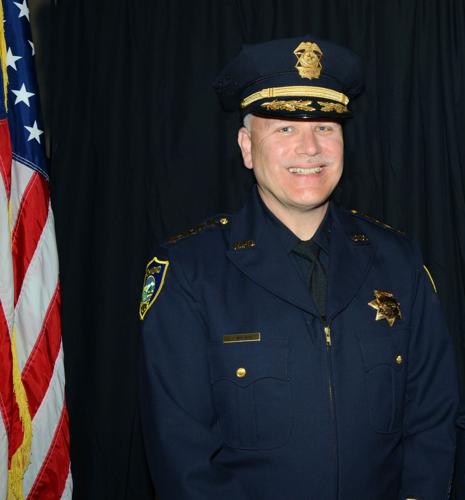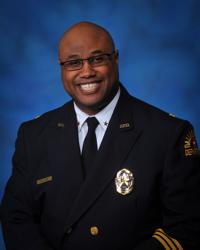You can picture City Manager Mike Ortega in his slippers this weekend, staring out the window, a résumé in each hand.
“Do I pick the white guy who said ‘Black lives matter,’ or the black guy who didn’t?”
“Do I pick the innovative small-city chief, or the traditional big-city police leader?”
“Do I go with the Democrats or the Republicans?”
The new city manager’s first big decision, selecting a police chief, has turned into a competition between significant local-interest groups. He’s planning to forward his pick to the council for their up-or-down vote on Tuesday.
A citizens committee made up in good measure of prominent Tucson liberals enthusiastically recommended Richmond, California, police chief Christopher Magnus. Soon after, the Tucson Police Officers Association issued a critique of Magnus and recommended instead that Ortega tag Malik Aziz, a deputy chief of the Dallas Police Department.
That’s not so surprising. This may be a blue city in a red state, but we have a red police force. The department, as is true in many big cities, is more politically conservative than the citizenry and concerned with different qualities in a chief.
It’s the reality Ortega came into when he drove in from Cochise County and took the manager’s job July 1. At the time, the city had already hired the Police Executive Research Forum to conduct a national search for a new chief.
Ortega’s team of city executives received a whittled-down group of 15 semifinalists from the forum and pared it down further to five finalists. That’s where interesting things happened.
The top two internal candidates, Assistant Chief Ramon Batista and Assistant Chief John Leavitt, were eliminated. That was a shock to the rank-and-file, who appeared to favor Batista, said Jason Winsky of the Tucson Police Officers Association.
“We said even a year ago that we feel there are internal candidates who are qualified,” Winsky said. “When we went from 15 to five, that’s when we lost all of our internal candidates.”
It appears Ortega, the Tucson newcomer, wanted an outside police chief, though he told me Friday that he only asked for his executive team to pick the best finalists. When two of the final five dropped out, that left a very short list of three: Aziz, Magnus and Rick Gregory, who is in an academic position in Florida but was police chief in Provo, Utah, before that.
The 15-member committee interviewed the three finalists and loved Magnus.
“He’s a force larger than life,” committee member Jeff Rogers, an attorney and former Democratic Party chairman, said. “He nailed it — charming, charismatic.”
“I think he’s amazing,” said committee member Margarita Bernal, a retired Tucson city court judge. “The guy is really creative. He’s really smart.”
The committee liked Magnus’ experiences with and insights into improving community-police relations in his majority-minority city. Perhaps the biggest symbol of that was when Magnus held up a sign saying “Black Lives Matter” at a December 2014 protest.
You can imagine how that went over with Tucson police. “Black Lives Matter” may be a self-evident statement reinforcing the idea that African-Americans are of equal value in society, but police have come to view it as an anti-law-enforcement battle cry.
It’s an insecure position that TPOA vice president Brad Pelton embraced when he went to Richmond to research Magnus and saw a cartoon of his participation in the Black Lives Matter protest hanging on the wall. My colleague Caitlin Schmidt quoted from a memo Pelton sent members:
“I did not get close enough to read what it said, but the fact that it was hanging prominently on his wall spoke volumes to me as to the pride he has with being involved with this movement.”
Did I mention Magnus is gay and married? Magnus is gay and married. You can imagine that fact might have had a positive effect on the citizens committee members and a negative one on some officers.
Pelton and TPOA didn’t bring that up in their evaluation of Magnus, though. Instead, they found him to be a chief who benefited from a rich flow of tax money that allowed him to hire additional officers, pay for lots of overtime and reduce crime. That won’t happen in Tucson with its financial problems, Winsky noted.
They also reported that he seemed to be a chief whose perspective would change with the political winds. They met with Ortega and told him their concerns, Pelton noted in his memo, including this telling comment:
“We outlined our concerns highlighting the lack of support of our membership and the high probability of a vote of no confidence,” he wrote.
Can you imagine threatening a “vote of no confidence” in a chief who has not even been hired?
Aziz, Pelton reported, has been able to reduce crime and raise morale despite a shrinking budget like Tucson’s. Not only did the Tucson officers’ union endorse him, but the Pima County Deputy Sheriff’s Association also announced its support of the Tucson officers’ position.
Although two of the citizen committee’s members supported Aziz, Bernal and Rogers were not that impressed.
In contrast to Magnus, “Aziz is an old-fashioned, blue-collar kind of cop,” Bernal said.
The manager could have avoided receiving these contradictory messages if he’d allowed the police union, the citizens committee and the city executives to exchange ideas and questions before the interviews, Winsky told me.
“The manager’s office created a process by which it was very possible, if not even likely, that the cops and the citizens would pick two different people,” he said. “You could have seen this coming a mile away.”
But to be fair, the conflict probably was even more predictable than that. It’s baked into the tense relationship between a conservative police union and a liberal City Council, and indeed between the police rank-and-file and their chief in many cities.
“Obviously it’s a challenge because you’ve got differing perspectives,” Ortega told me Friday. “The way I’ve approached it is to say, ‘Give me your pros and cons and let me look at them.’”
The police union didn’t pick Ortega, though — the council did. So you shouldn’t be surprised if the manager goes with the guy whom the council’s people favored, the white guy who said black lives matter.









